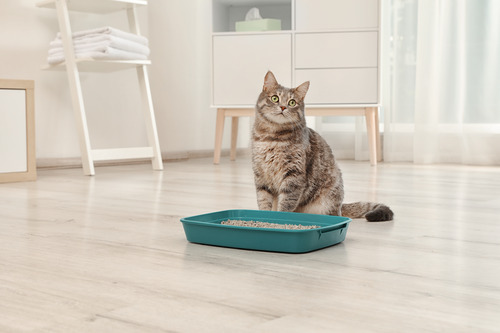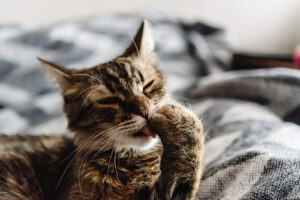If you notice your cat is not pooping, it can be a cause for concern. A change in your cat’s bowel habits might indicate underlying health issues that need attention. This blog will explore the potential reasons your cat might not be pooping, the symptoms to watch for, and when it’s time to seek veterinary care. At Chino Valley Animal Hospital, we understand the importance of your cat’s health and are here to help. If you’re concerned about your cat’s bowel movements, call (928) 636-4382 or request an appointment online.
Common Causes of Constipation in Cats
Constipation in cats can stem from various causes, ranging from dietary issues to underlying health conditions. Understanding these causes can help you determine the best course of action for your pet.
Diet and Dehydration
A common cause of constipation in cats is diet and dehydration. Cats that consume a dry food diet may not be getting enough moisture, leading to harder, drier stools. Ensuring your cat has access to fresh water at all times is crucial. Additionally, incorporating wet food into their diet can help increase their moisture intake, which can alleviate constipation.
Lack of Exercise
Cats that lead a sedentary lifestyle are more prone to constipation. Exercise stimulates the digestive system, helping to keep everything moving smoothly. Encouraging your cat to play and stay active can significantly improve their bowel health. Interactive toys, climbing structures, and scheduled playtime can promote a more active lifestyle for your feline friend.
Medical Conditions Leading to Constipation
Several medical conditions can cause a cat not to poop. It’s essential to recognize the symptoms and seek veterinary care when necessary.
Obstructions and Blockages
Foreign objects or hairballs can cause obstructions in your cat’s digestive tract, leading to constipation. Cats are curious creatures and may ingest items that can cause blockages. Symptoms of an obstruction include vomiting, lethargy, and a distended abdomen. If you suspect your cat has ingested something they shouldn’t have, contact Chino Valley Animal Hospital immediately.
Megacolon
Megacolon is a condition where the colon becomes abnormally enlarged, making it difficult for the cat to pass stool. This condition can be congenital or develop due to chronic constipation. Cats with megacolon may exhibit symptoms like straining to defecate, passing small amounts of liquid stool, and weight loss. Veterinary intervention is crucial for managing this condition effectively.
Behavioral and Environmental Factors
Changes in a cat’s environment or routine can also impact their bowel movements. Understanding these factors can help you identify potential causes of constipation.
Stress and Anxiety
Stress and anxiety can affect a cat’s digestive system, leading to constipation. Changes in the household, such as moving, new pets, or alterations in routine, can cause stress. Providing a stable, calm environment and using pheromone diffusers can help reduce your cat’s anxiety levels.
Litter Box Issues
Cats are particular about their litter boxes. A dirty or uncomfortable litter box can lead to avoidance, resulting in constipation. Ensure the litter box is clean, easily accessible, and placed in a quiet location. Additionally, consider the type of litter you use, as some cats have preferences that can affect their willingness to use the box.
Signs and Symptoms of Cat Constipation
Recognizing the signs of constipation can help you take prompt action to alleviate your cat’s discomfort. Here are some common symptoms to watch for:
Straining to Defecate
One of the most apparent signs of constipation is straining to defecate. Your cat may spend a lot of time in the litter box without producing any stool or only passing small, hard stools.
Changes in Appetite and Weight
Constipation can lead to a decrease in appetite and subsequent weight loss. If you notice your cat eating less or losing weight, it could be related to their bowel health.
When to Contact a Veterinarian
It’s important to know when to seek professional help for your constipated cat. Some situations require immediate veterinary attention.
Prolonged Constipation
If your cat has not pooped for more than two days, it’s time to contact your veterinarian. Prolonged constipation can lead to more severe health issues if left untreated. Your vet can perform diagnostic tests to determine the underlying cause and recommend appropriate treatment.
Additional Symptoms
If your cat exhibits additional symptoms such as vomiting, lethargy, or a distended abdomen, seek veterinary care immediately. These signs could indicate a more serious underlying condition that requires prompt attention.
Helping Your Cat Stay Healthy
Understanding the causes and symptoms of constipation in cats can help you take better care of your feline friend. By ensuring a balanced diet, promoting exercise, and maintaining a stress-free environment, you can help prevent constipation and keep your cat healthy. If you ever have concerns about your cat’s bowel movements, Chino Valley Animal Hospital is here to assist. Call us at (928) 636-4382 or request an appointment online for professional advice and care.





